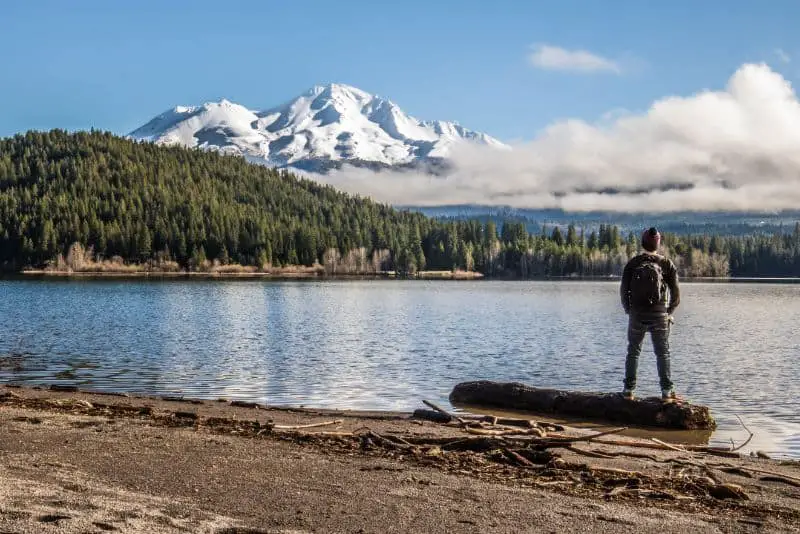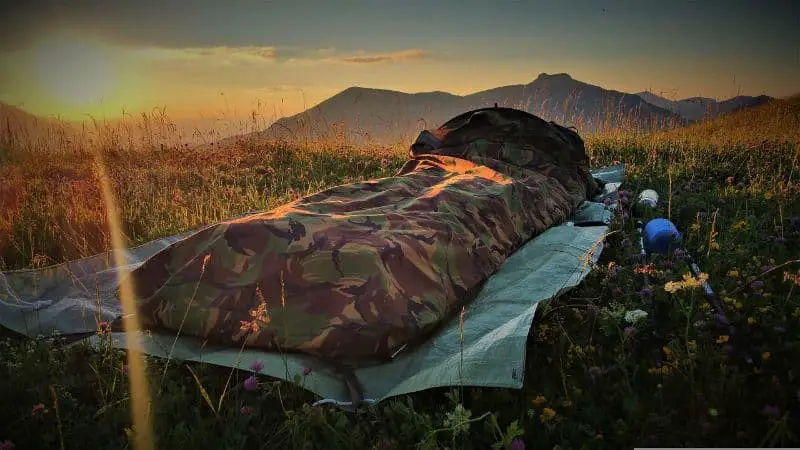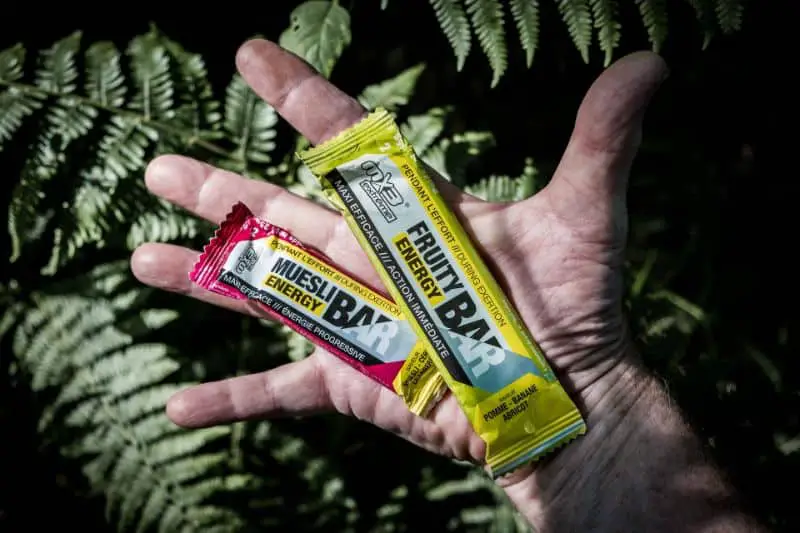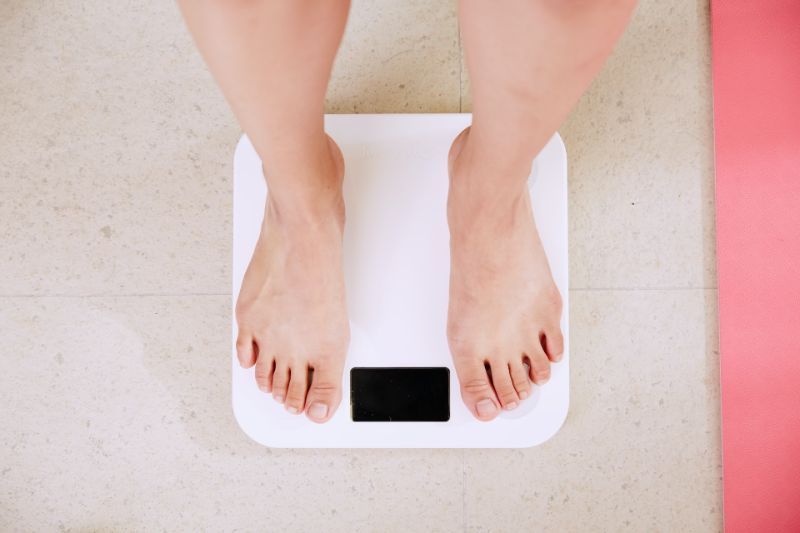If you spend enough time on the trail, you’ll eventually hear the Siren’s call. But it won’t be a flock of naked bird-women (or men, whatever you prefer) nesting on a cliff surrounded by rocky shoals. It’ll be a $9 carbon fiber tent stake.
Here’s my unpopular opinion: Ultralight packing is overblown for the recreational hiker.
Now before you lynch me in effigy, notice I didn’t say lightweight backpacking. Any smart backpacker or bike-packer should religiously count pounds (and sometimes ounces). Less weight means more miles and less wear and tear on your joints. I’m not denying physics.
But if you find yourself weighing titanium sporks on a kitchen scale, then might I suggest you’ve gone too far?
This article is an intervention. As a recovering ultralight packer myself, I have since realized the folly of chasing grams. Unless you’re the next Scott Jurek or you’re planning a thru-hike of the PCT, I think you’ll find most modern gear is light enough already.

P.S. It’s worth pointing out that ultralight backpacking is today defined as a pack weight of fewer than 10 lbs, although Ray Jardine himself thru-hiked the Pacific Crest Trail for the first time with a base weight of 13 lbs. Bit hypocritical, isn’t it?
When Ultralight Packing Leaves the First Aid Kit at Home
The real danger of the ultralight philosophy is when it extends to safety. It’s easy to start justifying abandoning the 10 essentials. Who needs a packable jacket – I’ll just bring along a plastic poncho instead! (Only the tree limbs easily rip holes in your paper-thin poncho so 5 minutes later you’re soaked to the bone and the poncho is now useless weight. Isn’t that ironic?)
Packing light is never an excuse to forgo a first aid kit. Mother Nature doesn’t give a sh*t if Ace bandages and safety pins are “too heavy.” Why would you venture into the Great Outdoors without the bare minimum to even treat a sprained ankle?
Similarly, packing light is never an excuse to not bring a topographical map and a compass on a backcountry expedition. I’m not suggesting you have to bring a GPS satellite phone, but will a USGS topo map really make or break your daily mileage?
If you hike alone, don’t count on someone being around to help you if you get hurt! You need the skills and know-how to self-rescue from common outdoor accidents, like sprained ankles, broken arms, snake bites, heat stroke, dehydration, and hypothermia.
When Ultralight Packing Ruins a Good Night’s Sleep
When it comes to tents and sleeping gear, ultralight is code for “too thin, rips easily, needs a DWR treatment every season, doesn’t stand up on its own, allows mosquitoes to dine on your feet, and is too difficult to set up in the dark.”
I used to have a hooped bivy sack similar to the AquaQuest Hideaway. Weighed less than 2 lbs – and boy, I was proud! (Although some ultralight backpackers would laugh at that weight). The tent was the size of a pint of milk when packed up. Here’s a picture of a similar setup:

- However … the bottom of my sleeping bag was soaked with condensation every morning.
- When the rains poured for hours, I could feel every drop rolling off the single-wall fabric.
- I had nowhere to shove my backpack; it sat outside on the cold, wet ground, partially protected by a thin nylon rain cover (which didn’t work very well.)
- And when the mosquitoes tracked down the carbon dioxide in my breath, I had just enough room to zip up the roof and hold a book 1.5” above the nose.
- (Yes, I brought a book. Funny how I wouldn’t buy a 3-lb tent but I could bring along a 370-page book, isn’t it?)
- (I also refused to bring a sleeping pad. I slept directly on the ground. Ah, youth.)
Again, don’t misunderstand me – I’m all about small and lightweight! Today, I mostly use a Kelty double-wall freestanding tent that weighs about 3.5 lbs when packed. If money’s no issue, you can even splurge on a Big Agnes Copper Spur which weighs just 2 lbs 6 oz!
But if you’re about to spend $140 on a 7.5-oz Gossamer Solo Tarp glorified piece of tissue paper, then I question – why even have a tarp? It’s like trying to cover up with a postage stamp! Just face the rain like a man! Or save yourself $137 and just bring along a $3 Mylar emergency blanket.
(Full disclosure: I still love hooped bivy sacks. I just don’t use them if I know lots of rain or humid, sticky weather is in the forecast. I also love hammock systems, which can weigh less than 1 or 2 lbs, even with paracord straps and a rain fly.)
When Ultralight Packing Defies Common Sense
I understand the emotional drive to cut weight. On my first bike-packing trip, after traveling 300 miles, I filled up an Aldi brown paper bag with everything I decided I didn’t need and then left it at a city park with a Dear John letter. I was sick and tired of humping that weight hill after sorry hill.
But when ultralight packing turns into gear anorexia, you have a problem. Here are some symptoms you may want to watch out for:
- Do you cut the tags off your gear?
- Are you buying carbon fiber tent stakes that can’t be hammered without breaking?
- Do you carry a utility knife blade rather than a folding knife?
- Could your mummy sleeping bag double as a straight jacket?
- Are you packing a 40-degree down sleeping quilt for a 20-degree October night?
- Do you wipe with a single towelette square?
- Did you ignore the advice to carry a bug head net? (betcha only made that mistake once!)
- Instead of cutting your toothbrush in half, do you just ditch the toothbrush entirely and pretend you forgot it so other people don’t think you’re gross?
- Are you spending more time thinking about gear weight than all the cool places you could go hiking?*
*This one is courtesy of the magnum opus, “50 Signs You May Have Taken Ultralight Backpacking Too Far” at The Hiking Life. Great read!
When Ultralight Packing Ruins a Good Meal
When you’re counting grams, suddenly, luxuries like oranges and apples become anathemas. You’re carrying water weight, you schmuck! You’re carrying vitamins and minerals you could suck down with a 7-gram multivitamin! You’re carrying peels and seeds and stems that can’t even be eaten!
And so instead of giving yourself permission to bring along a delicious orange to celebrate a long day on the trail, you dutifully bring along organic chia seed bars instead. And let’s be honest – nobody likes organic chia seed bars.

If your goal is to only bring nutrition with the best calories-to-weight ratio, then might I suggest you bring a jar of peanut butter and a spork? (Actually, forget the spork – just use your fingers. For that matter, did you clip your fingernails short?)
Lighten up! (no pun intended). Bring that Snickers. Or can of Coke. Or orange. Whatever food makes you happy at the end of the trail. We don’t hike so we can practice asceticism; we go to enjoy the Great Outdoors. And to most of us, that means chocolate.
When Ultralight Packing Distracts You From the “Bigger” Problem
I’ll choose my words carefully here …
If I needed to lose 10 lbs off my pack weight, the easiest place to start would be my own stomach.
(And if I was thru-hiking, I wouldn’t have to worry about it, because the miles would take their toll very quickly anyway.)

Very few of us walk around at 6% body fat. On top of that, did you know average human weight can fluctuate 5-6 lbs per day? That’s right – you just spent $350 on a Hyperlite backpack to shave off 2 lbs, and yesterday’s carb-fest added it all back in.
Look to the plank in your own eye …
Where Ultralight Packing Has the Right Idea
Lest you think I’m here to bash ultralight backpacking, oh no no, think again!
Here are some of the things I’ve learned from my trials with ultralight packing:
- Focus on the Big Three: Tent, Sleeping System, and Backpack. If you’re going to splurge on ultralight gear, splurge here. Just don’t over-sacrifice. Make sure it can actually protect you (and your gear) from rain, snow, sun, insects, tree limbs, thorns, and wind. And remember: When you seek weight savings, you almost always sacrifice durability and versatility.
- Going stove-less. Nothing wrong with leaving the Jetboil at home and just enjoying cold meals and granola bars. You’ll appreciate burgers so much more when you return home! (Personally, I only use alcohol stoves, which have the benefit of being both lightweight and cheap.)
- Dual-purpose apparel. I do love my convertible hiking pants, bandanas, and nylon stuff sacks (which can double as a pillow at night.)
- Chemical water disinfectants. Depending on where you’re traveling, you might be able to forgo a mechanical pump water filter for a chemical disinfectant like bleach or iodine. Or go with a super lightweight water-filter-for-one like a LifeStraw.
- Running shoes over hiking boots. Oh man, I’m a big fan of this one! I read somewhere that losing 1 lb off your feet is like losing 5 lbs of your back. I will opt for trail running shoes (or sport sandals) any day over leather hiking boots, especially when hiking uphill.
- Fanny packs over daypacks. A fanny pack (or “waist belt,” as I priggishly choose to call it) really does save the day when you’re day hiking instead of multi-day backpacking.
Ultralight Hiking Gear Takeaways
In my experience, you can easily reduce your base weight to less than 15 lbs without spending $400 on a down puff jacket or cutting the hip straps off your backpack.
As one Reddit poster said, “You don’t have to buy anything to be ultralight. You have to bring less.” And while taking that advice to an extreme is obviously dangerous, he’s onto something.
You see, the most important part of ultralight packing is the ethos, “Bring only what you need and nothing you don’t,” not how much money you spend or grams you shave off.
Incredible advances in technology have already made “normal” backpacking gear ultra lightweight compared to the past, oh, I don’t know, 100,000 years of human history. You could buy all your gear at the Walmart clearance aisle and still get away with 15 lbs base weight!
So don’t sweat the ounces. Focus on the pounds. And when that rail-thin ultralight thru-hiker zips past you on the trail, just remember that you’ll end the day happily slurping on an orange, and he’ll be digging chia seeds out of his gums and wishing he had actually packed his toothbrush.

